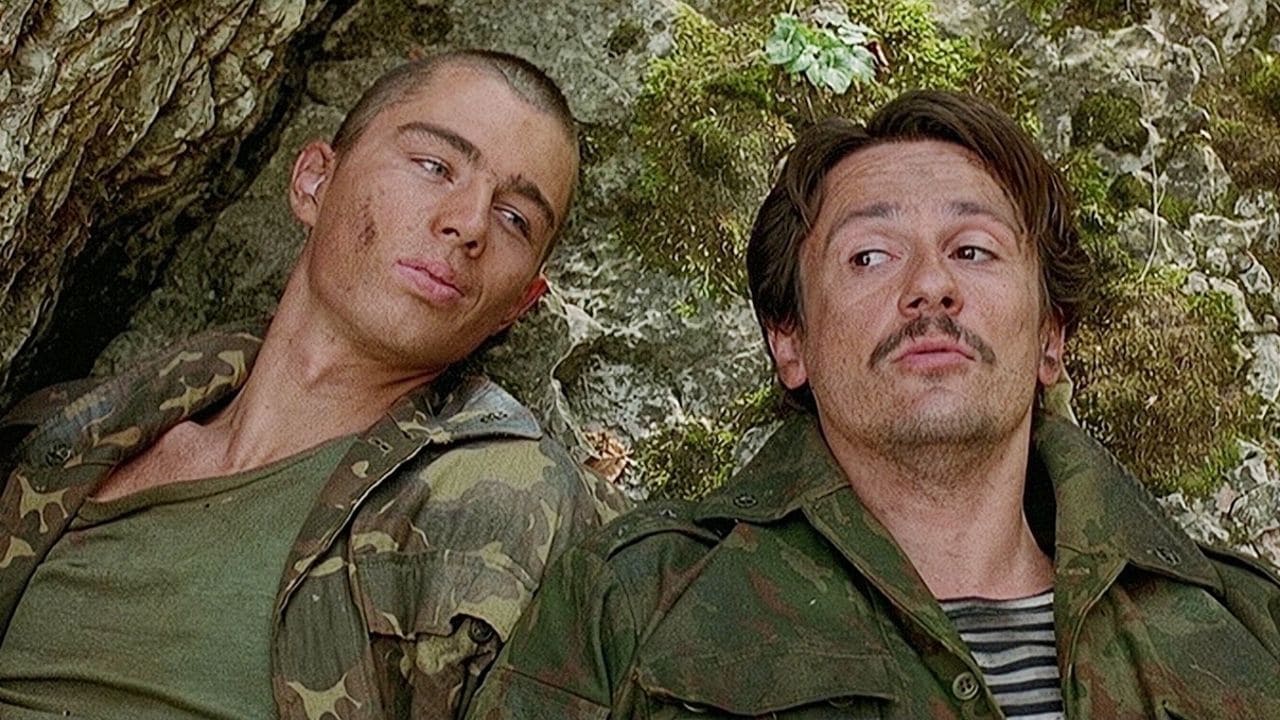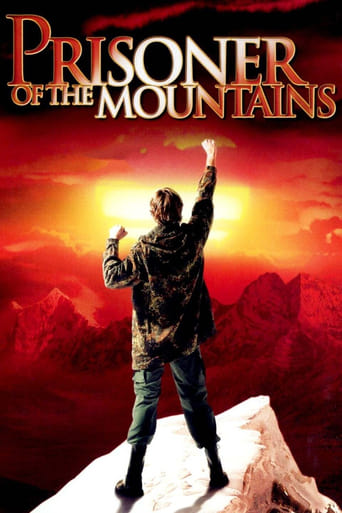

Absolutely amazing
... View MoreThis is one of the few movies I've ever seen where the whole audience broke into spontaneous, loud applause a third of the way in.
... View MoreLet me be very fair here, this is not the best movie in my opinion. But, this movie is fun, it has purpose and is very enjoyable to watch.
... View MoreMostly, the movie is committed to the value of a good time.
... View MoreIn Bodrov's Prisoner of the Mountain, Ivan (Vanya) has just entered the Russian army. He's barely uniformed by the time he is on his way to Chechnya. On the road into the mountains, the group comes under attack by a group of Chechen rebels. Vanya and Sacha are both knocked out and taken prisoner by the Chechens in the attack. One of the Chechens, Abdul, is hoping to trade the two Russians for his son, who is being held in a Russian army prison. The story that ensues shows both the cruelty and humanity that can be found in war. Both sides commit atrocities: the two captives kill the mute Hassan in their struggle as they attempt to escape—this is one cruelty on the Russian side. A Chechen father kills his son who has traded sides in order to work for the Russian police. Neither side has its hands clean. However, even in the midst of war, love can be found in this story— not just the fraternal love that grows between Vanya and Sacha, but love between enemies. Abdul's daughter Dina is kind to the captured soldiers, and in turn, Vanya shows her kindness she doesn't experience from her peers. She wants to help him escape, but he refuses to go because he knows that the rest of the villagers will never forgive her. Vanya, throughout the movie, represents an opposition to war. He never directly kills anyone, and never even learns how to properly handle a gun; even by the end of the movie, he is misfiring his weapons. When he is going to spar with the Chechen leader's nephew, he comes off as a pacifist. Even when he knows Sacha is dead, he doesn't turn to violence as a solution. A beautiful story with a beautiful backdrop, Prisoner of the Mountain is a true Russian gem.
... View MoreI thought that this movie was an okay one to watch. It shows us that we are all humans, and we all have feelings and hopes and dreams. We see the lives of the villagers and we begin to understand them, just as the main character does. We see that war affects everyone on both sides of the struggle, and not everyone on the side of the "enemy" is evil. On both sides of a struggle, everyone thinks that they are right. Some people are bad, but they all get mixed together so its hard to tell the difference between the two. This movie also shows that in dire situations you will do what you have to do in order to survive, even if that means that you are going to have to hurt some people in the process.
... View MoreI rented this film expecting something a bit different - maybe something in the style of "Kukushka" - a story with a deep understanding of human nature, but with a feel good ending. I got an even better film.This film sneaked into my heart slowly and quietly. Like Vanya, I grew to understand and love its characters, regardless of "sides". As the plot developed, I understood how easy it was for one side to mistake the other one's intentions; how tradition, so important for people's cultural survival, ended up working against them, fueling the fire that perpetuated the hate; how one side's disregard about the other one's culture/mentality, and the stereotypical way of looking at the enemy added to the mistrust and hatred between both sides.The story is told with cinematic brilliance: simply, almost austerely, with tiny details that make the viewer grow an affectionate, understanding eye for the characters: little Dina, with her lonely, pure heart, adorning herself for Vanya and telling him about her grandmother's necklace, or explaining with the wisdom of a grown-up why she and he could never marry; the children and the Muslim soldiers dancing and playing according to their customs; tongueless Hassan; Vanya's mother hitting the Russian commander when she realizes his methods would get her son killed instead of rescued, dare-devil Sacha with his phlegmatic, humorous yet realistic view on life and war; the Russian Commander's appreciation for good quality food and vodka, etc. Then, there are the human interactions between the two sides: the Russian soldiers trading weapons for vodka with the enemy; the Muslim soldiers showing respect for the two Russian prisoners who managed to clear a road of mines and stay alive; Hassan procuring alcohol for the two prisoners and letting them dance and enjoy themselves, the Muslim villager asking Vanya to fix his clock...The cinematography is excellent; the beauty of the film comes not from any artificially enhanced imaging of the beautiful, harsh landscape, but from authenticity and masterful lens work. This film is unadulterated by big budget glitzy details; one almost feels is watching a documentary of the life in that part of the world, which makes the plot of the film hit like real events would and affect us almost as if we were on that mountain too.Many people are killed in this film, yet one feels there are no good or bad characters, only human beings locked in a conflict that perpetuates itself, because each side's quest for justice is confused with exacting retribution or revenge. Vanya and, eventually, Abdul see that, but like everyone else, they're prisoners of their own circumstances. The film's ending tore at my heart. As the helicopters were flying towards the village, I realized that was the only logical, true to life ending. A happy end that would please the viewer, where things were clarified and Abdul's final act of humanity and compassion was not fruitless, was not possible without turning the film into a fairy tale for adults.A complex, poignant story told in a masterful way.
... View MoreSergei Bodrov shows here that he is one of the most talented filmmakers in Russia today, with this riveting tale from the Chechen war. "Kavkazskij plennik" stars his own son Sergei jr. and Oleg Menshikov and both do a fabulous job as the Russian soldiers imprisoned by the Chechens in Caucasus.This movie is just what the world needed at such a time-an open hearted and humanistic telling about the evils of war and the uselesness of it all. Although the Russians can sometimes seem portrayed as the better side here and Chechens as ruthless, primitive, barbaric religious fanatics, the portrayal of the Russian commander quickly erases that impression. Here we see the laid back and careless attitude that mirrors the real Russian generals' attitude.The film is pretty tragic, from the death of Menshikov's character and to the tragic and unfortunate killing of Abdul-Murat's son, yet it leaves some hope in the end as Abdul-Murat shows pity for the young soldier whose mother has appealed for his release directly to him. But just as you think that this film will end well, the airplanes come. The ending is truly remarkable and well shot. It echoes the message of the absurdity of war and leaves us with little hope for the peace in the Caucasus.10 out of 10.
... View More